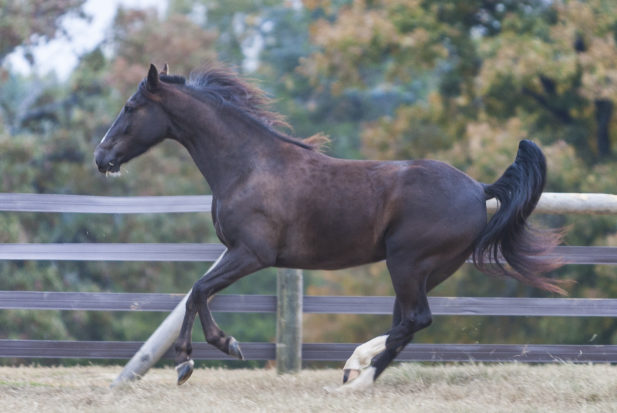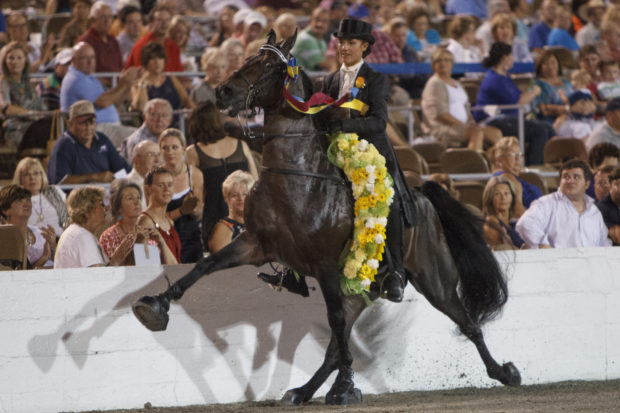No one should get away with animal cruelty. Not an individual and not an industry. But that’s what’s been happening with scofflaw owners and trainers within a segment of the Tennessee walking horse show industry.
This week, we applaud the U.S. Department of Agriculture for issuing a proposed rule, fulfilling a number of the requests in a February 2015 rulemaking petition filed by attorneys for The HSUS with pro bono help from Latham & Watkins. The proposed rule contains game-changing reforms to end the half-century-long battle against the soring of Tennessee walking horses, racking horses and related breeds – a vile practice in which caustic chemicals, chains, hard objects, cutting, and other gruesome techniques are used to injure the horses’ front legs and hooves and force them to perform an artificially high-stepping gait known as the “big lick.” This sort of calculated, appalling cruelty should never be tolerated.

The new federal rule contains game-changing reforms to end the half-century long battle against the cruel practice of soring Tennessee walking horses, racking horses, and related breeds. Above, a walking horse rescue at the Doris Day Equine Center. Photo by JP Bonnelly
Since 1970, a federal law intended by Congress to end soring – the Horse Protection Act (HPA), 15 U.S.C. § 1821 et seq. – has been on the books. The USDA was charged with enforcing the law, but due to underfunding and political interference from those defending the horse sorers, for most of the past 40 years the very segment of the show horse world that created the soring problem has been allowed to police itself and perpetuate the rampant abuse.
Mainstream horse industry groups and veterinary organizations such as the American Horse Council, American Association of Equine Practitioners, and American Veterinary Medical Association have tried to work with and encourage the walking horse crowd to bring about change from within – but more than a few stubborn horse owners and trainers continue to think they are above the law. Humane groups have lobbied the USDA for stronger enforcement, supported its efforts, and even sued the agency in an attempt to secure long overdue protections for the stoic, majestic equine victims of a culture of abuse as seedy and dark as the nation’s worst cockfighting and dogfighting rings. The HSUS has conducted undercover investigations of leading horse training establishments, exposed the corruption and cruelty within the industry, and demonstrated that – as the USDA’s own Inspector General determined in a 2010 audit of the Horse Protection program – the current system is still hopelessly broken, and nothing short of significant reforms will fulfill the intent of Congress and break the cycle of cruelty that is so endemic to the big lick walking horse circuit.

Soring is a vile practice in which caustic chemicals, chains, hard objects, cutting, and other gruesome techniques are used to injure the horses’ front legs and hooves and force them to perform an artificially high-stepping gait known as the “big lick.” Photo by The HSUS
In recent years, Congress has attempted to close loopholes in enforcement of the HPA through federal legislation. The Prevent All Soring Tactics (PAST) Act, H.R.3268/S.1121, has garnered vast, nearly unprecedented endorsements by virtually all sectors of the horse industry, veterinary community, animal protection movement, law enforcement, key individuals in the walking horse show world, and a broad bipartisan majority in both the House and Senate with 314 cosponsors combined currently. But a handful of obstructionist federal legislators aligned with the soring crowd have thus far managed to block this broadly supported bill from coming to a vote. No longer can a handful of lawmakers stymie the will of the vast majority of key stakeholders and Americans.
The USDA has the authority under current law to strengthen its own HPA regulations to more effectively crack down on soring. The lead House and Senate sponsors of the PAST Act and 175 cosponsors sent letters this spring calling on the administration to move forward quickly with this rulemaking and ensure that it covers the key reforms. The agency has agreed, recognizing that these changes are necessary in order to effectuate the purposes of the HPA, and has put forth for public comment a robust set of regulatory changes in this proposed new rule, including the following:
- Abolishing the current system of industry self-regulation and in its place implementing a network of independent, third-party inspectors licensed, trained, and overseen by the USDA, at no new cost to the taxpayer
- Prohibiting the use of stacked horse shoes, ankle chains, and other “action devices” at competitions, on horses in the Tennessee walking, racking, and related breeds (those that have been chronic victims of soring).
These provisions, consistent with key elements of the PAST Act, The HSUS’ 2015 petition and the congressional letters, should finally help bring an end to soring and salvage the walking horse industry, securing its place in the humane economy of the 21st century and beyond. It’s time for equestrians, animal lovers, and humane-minded people across America to step up and show their support for this proposed rule during the public comment period which ends September 26th. We should show a zero tolerance policy as a nation for this intentional cruelty to horses – especially when the goal of the sorers is nothing but a few ribbons at horse shows and notoriety within their small, insular subculture.
Enviroshop is maintained by dedicated NetSys Interactive Inc. owners & employees who generously contribute their time to maintenance & editing, web design, custom programming, & website hosting for Enviroshop.
